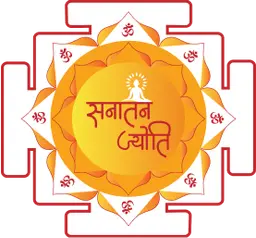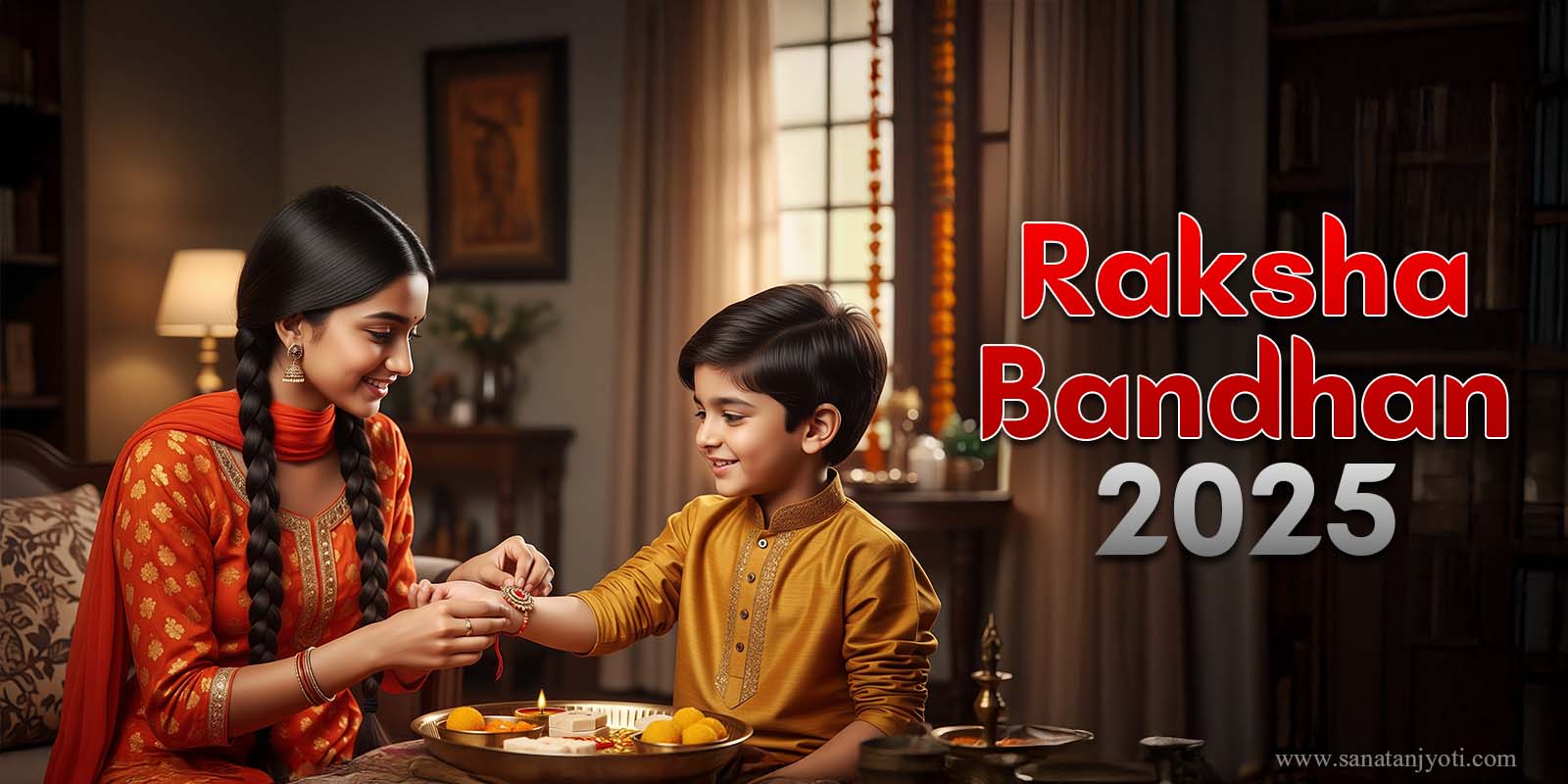
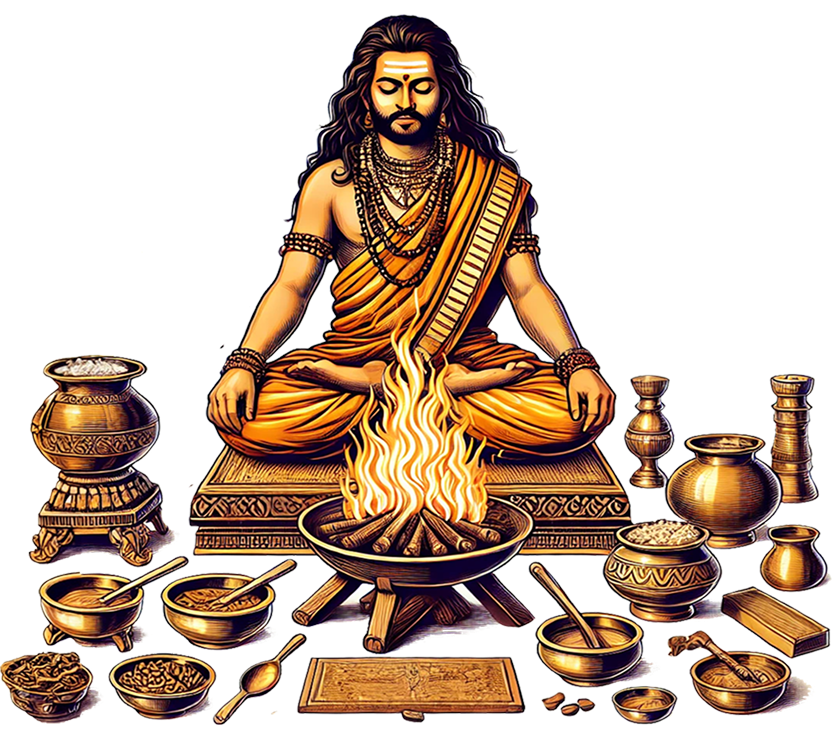
Book Anushthan

Unlimited Talk to Astrologer
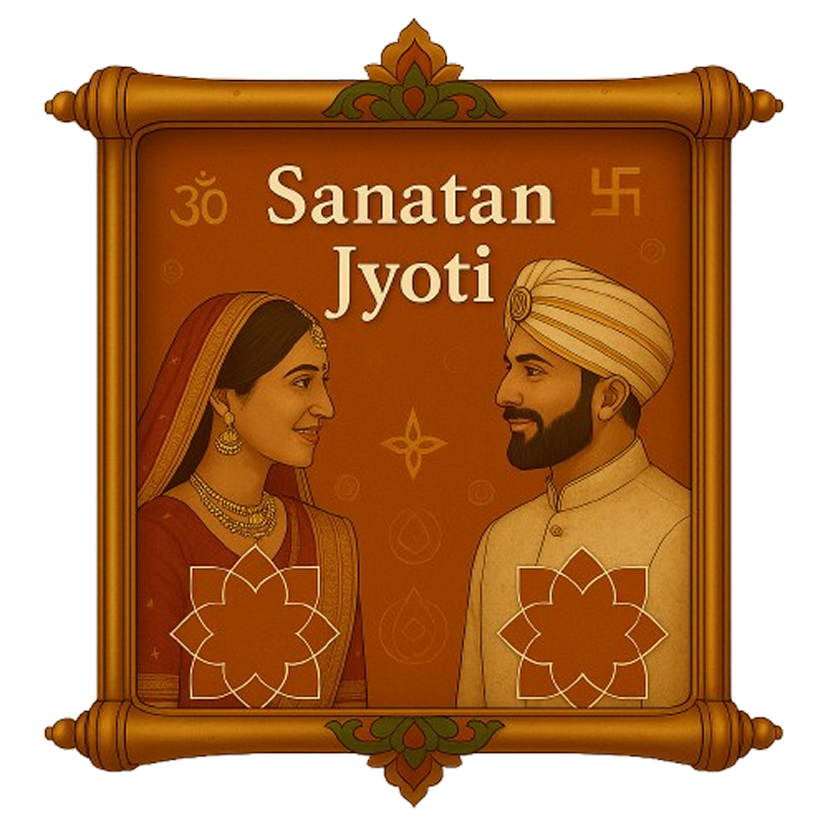
Match making in Rs 99

Muhurat Consultation
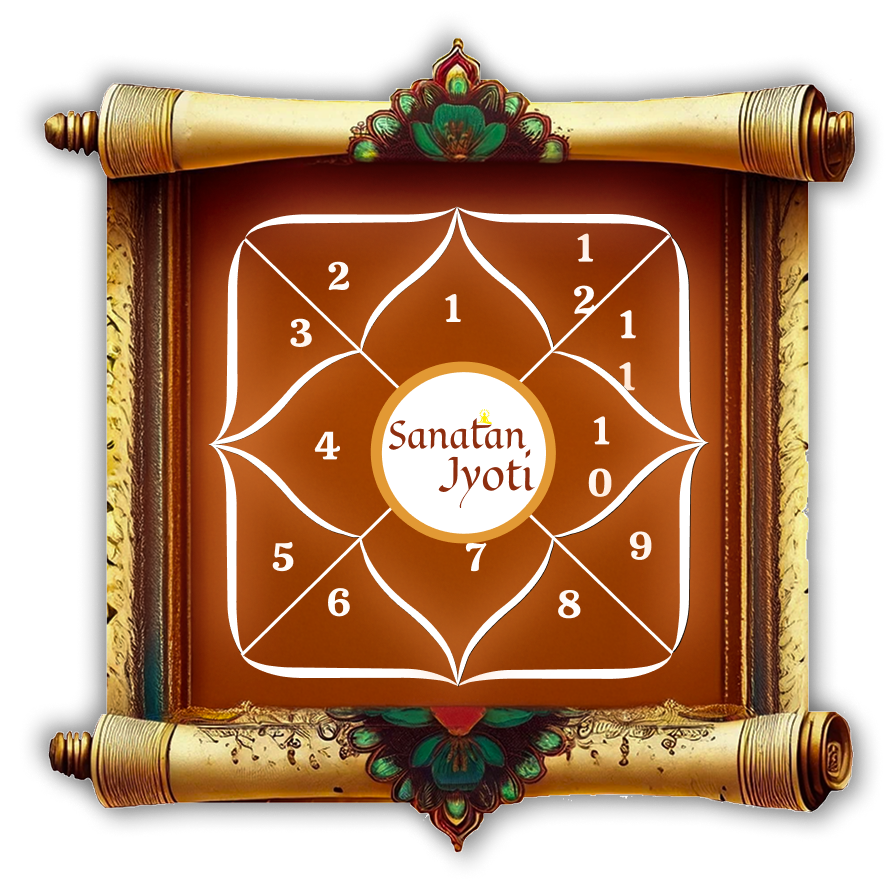
86 Pages Faladesh Kundli
Raksha Bandhan 2025
Raksha Bandhan is an ancient Sanatani (Hindu) festival, and its literal meaning is "the bond of protection." This festival is celebrated on the full moon day (Purnima) of the month of Sawan (Shravan). On this day, sisters apply a ceremonial tilak on their brothers' foreheads and tie a Rakhi (a sacred protection thread) on their wrists, while praying for their brothers' safety and success.
The essence of Raksha Bandhan lies in the promise of protection. On this occasion, while the sister wishes for her brother's health and prosperity, the brother, in return, vows to protect his sister.
This festival beautifully reflects the love and affection between brothers and sisters. It not only strengthens the unbreakable bond between siblings but also plays an important role in preserving family values and relationships.
As per the legend, on this very day, Goddess Shachi tied a Raksha Sutra (protective thread) to Lord Indra. This story of Indra and Indrani is associated with the Raksha Bandhan fast. This significance is also mentioned in the Puranas, and hence, sisters have been observing this fast for their brothers for centuries.
It is important to observe the auspicious timing and avoid the Bhadra period before tying the Rakhi. Tying Rakhi during Bhadra is considered inauspicious, as Bhadra is believed to be an unfavourable time during which no auspicious activities should be performed.
This festival is not limited to biological siblings alone—Rakhi is also tied to those whom a woman considers like a brother. Raksha Bandhan strengthens family unity and emotional connection.
The core essence of Raksha Bandhan is to revive and celebrate the love and respect between siblings. Even in the modern context, this festival serves as a reminder of familial bonding, mutual respect, and loyalty.
From a mythological perspective, tying a raksha-sutra is symbolic of invoking divine protection and receiving spiritual inspiration from the gods and goddesses. According to spiritual guides from Amritapuri, the act of tying a Rakhi not only strengthens blood relationships but also sends a broader message of brotherhood at the social level.
The concept of raksha-sutra extends beyond just brothers and sisters — it can include husband-wife, teacher-student, friends, and even neighbors, promoting universal harmony and the ancient Indian value of Vasudhaiva Kutumbakam — "the whole world is one family."
The essence of Raksha Bandhan lies in the promise of protection. On this occasion, while the sister wishes for her brother's health and prosperity, the brother, in return, vows to protect his sister.
This festival beautifully reflects the love and affection between brothers and sisters. It not only strengthens the unbreakable bond between siblings but also plays an important role in preserving family values and relationships.
Raksha Bandhan Vrat
On the day of Raksha Bandhan, sisters also observe a fast, known as "Raksha Sutra Vrat". According to tradition, sisters keep this fast and worship the Lord for the long life and well-being of their brothers.As per the legend, on this very day, Goddess Shachi tied a Raksha Sutra (protective thread) to Lord Indra. This story of Indra and Indrani is associated with the Raksha Bandhan fast. This significance is also mentioned in the Puranas, and hence, sisters have been observing this fast for their brothers for centuries.
Raksha Bandhan 2025
The festival of Raksha Bandhan is celebrated on the full moon day (Purnima) of the Shukla Paksha in the month of Sawan. In the year 2025, Raksha Bandhan will be celebrated on Saturday, August 9. The auspicious time (Shubh Muhurat) for tying the Rakhi is from 6:00 AM to 1:24 PM.It is important to observe the auspicious timing and avoid the Bhadra period before tying the Rakhi. Tying Rakhi during Bhadra is considered inauspicious, as Bhadra is believed to be an unfavourable time during which no auspicious activities should be performed.
What is Raksha Bandhan?
Raksha Bandhan is a traditional Hindu festival that symbolizes the unbreakable bond of love, trust, and protection between a brother and sister. It is celebrated on the full moon day (Purnima) of the month of Shravan. On this day, a sister ties a Rakhi (sacred protection thread) on her brother's wrist and prays for his long life, happiness, and prosperity. In return, the brother vows to protect his sister for life.This festival is not limited to biological siblings alone—Rakhi is also tied to those whom a woman considers like a brother. Raksha Bandhan strengthens family unity and emotional connection.
The core essence of Raksha Bandhan is to revive and celebrate the love and respect between siblings. Even in the modern context, this festival serves as a reminder of familial bonding, mutual respect, and loyalty.
Raksha Bandhan Date and Time 2025
- Raksha Bandhan festival date: 9 August 2025
- Purnima Tithi Begins: August 8, 2025, at 2:13 P.M
- Purnima Tithi Ends: August 9, 2025, at 1:25 P.M
- Bhadra Begins: August 8, 2025, at 2:12 P.M
- Auspicious Time for Tying Rakhi: August 9, 2025, from 6:00 A.M to 1:24 P.M
Story of Raksha Bandhan
There are many folk tales and legends associated with the origin of Raksha Bandhan.
- Indra–Indrani Legend: According to the Bhavishya Purana, during a fierce battle between the gods and the demons, Lord Indra began to lose. On the advice of Guru Brihaspati, Indra's wife, Devi Shachi, tied a sacred protection thread (Rakhi) on his wrist on the day of Shravan Purnima. The power of this ritual gave Indra immense strength, enabling him to defeat the demons and reclaim his kingdom.
This Indra–Shachi story is considered one of the earliest origins of Raksha Bandhan. Initially, it symbolized a wife tying a thread for her husband's protection, which later evolved into the festival celebrated as a bond between brothers and sisters. - Lakshmi–Bali Story: According to a popular folk tale, the demon king Bali pleased Lord Vishnu with his devotion and requested Him to stay in the Patal Lok (the netherworld) with him. Lord Vishnu agreed and began living in Bali's kingdom. However, Goddess Lakshmi did not like this, so she went to King Bali in disguise, tied a Rakhi on his wrist, and accepted him as her brother. In return, she asked for Lord Vishnu's presence as her gift. King Bali, honoring his sister Lakshmi's wish, granted her request. This story is also believed to be one of the origins of the Raksha Bandhan festival.
- Draupadi–Krishna Story: Once, Lord Krishna accidentally cut His finger. Seeing this, Draupadi, who was nearby, immediately tore a piece of her saree and tied it around His finger to stop the bleeding. Touched by her gesture, Krishna promised to protect her from any harm. Later, when Draupadi was humiliated in the royal court after being lost in a game of dice, Krishna miraculously saved her by providing an unending stream of sarees, preventing her disrobing. This incident established a bond like that of a brother and sister between Krishna and Draupadi. It also added to the reverence of Raksha Bandhan.
- Queen Karnavati and Humayun in History: According to a popular historical tale, in 1533 CE, Queen Karnavati of Chittor sent a Rakhi to the Mughal emperor Humayun, seeking his help and protection like a brother. Though of a different religion, Humayun honored the gesture and came to her aid, defending her son Maharana Vikramaditya. While some historians debate the accuracy of this account, it is widely accepted in folklore and has become associated with Raksha Bandhan.
These stories clearly show that the core purpose of Raksha Bandhan is to celebrate love, protection, and moral responsibility between a brother and sister.
Religious Significance of Raksha Bandhan
Raksha Bandhan holds deep religious and spiritual importance. In Sanskrit, "Raksha" means protection, and "Bandhan" means bond. The Rakhi thread is considered a sacred string that, when tied, is believed to ward off negative energies. This festival reminds us of the duties between siblings and the importance of protecting and upholding the family bond.From a mythological perspective, tying a raksha-sutra is symbolic of invoking divine protection and receiving spiritual inspiration from the gods and goddesses. According to spiritual guides from Amritapuri, the act of tying a Rakhi not only strengthens blood relationships but also sends a broader message of brotherhood at the social level.
The concept of raksha-sutra extends beyond just brothers and sisters — it can include husband-wife, teacher-student, friends, and even neighbors, promoting universal harmony and the ancient Indian value of Vasudhaiva Kutumbakam — "the whole world is one family."
Rakshabandhan in Hinduism
- Raksha Bandhan is a major and traditional festival of the Hindu religion.
- It is celebrated on the full moon day (Purnima) of the month of Shravan.
- On this day, a sister ties a Rakhi on her brother's wrist and prays for his long life and protection.
- The brother gives a gift to his sister and promises to protect her.
- According to religious belief, this festival symbolizes love, trust, and responsibility between brothers and sisters.
- References to Raksha Bandhan can also be found in historical and mythological stories, such as the tale of Draupadi and Krishna.
Rakshabandhan in Jainism
- Raksha Bandhan is not a religious festival in Jainism.
- There is no clear mention of Raksha Bandhan in Jain Agamas or religious traditions.
- Some Jain families celebrate this festival from a social or cultural perspective.
- Rakhi is accepted as a symbol of love and responsibility between siblings.
- Whether to celebrate it or not depends entirely on personal sentiment and family tradition.
Rakshabandhan in Sikhism
- Raksha Bandhan is not a festival of Sikhism.
- There is no mention of it in the Guru Granth Sahib or other Sikh religious scriptures.
- Some Sikhs accept it as part of Indian culture and celebrate it as a social festival.
- Whether to observe it or not depends entirely on personal belief and cultural connection.
- Sibling love is valued in Sikhism, but there is no religious tradition of tying Rakhi.
Rakshabandhan in Islam
- Raksha Bandhan has no religious significance in Islam.
- There is no instruction about it in the Quran or Hadith.
- If a Muslim observes it as a religious or devotional act, it is not considered appropriate from an Islamic viewpoint.
- Some people celebrate it purely as a social occasion to honour the sibling bond, but doing so depends entirely on personal choice.
Rakshabandhan in Christianity
- Raksha Bandhan is not a Christian festival.
- There is no mention of it in the Bible.
- Some Christians accept it as part of Indian culture and celebrate it as a social occasion.
- Whether to observe it or not depends entirely on an individual's discretion and personal faith.
Raksha Bandhan Rituals
Raksha Bandhan is not just a festival, but a symbolic and spiritual bond between a brother and sister. The significance lies not only in tying the Rakhi, but also in the many religious rituals and emotional traditions associated with it.
- Bath and fasting on Shravan Purnima: Raksha Bandhan is celebrated on the full moon (Purnima) of the Shravan month. On this day, taking a bath in the morning and observing a fast is customary. Women and girls keep a fast praying for the long life and well-being of their brothers.
- Preparation for Rakhi Worship:
- A plate (thali) is arranged with Rakhi, kumkum, rice (akshat), a lamp (diya), sweets, and the sacred thread (raksha sutra).
- The plate is decorated beautifully with rangoli or flowers.
- Aarti and Tilak Ritual:
- The sister applies a tilak on her brother's forehead using roli and akshat (rice).
- She then performs an aarti with a lit diya and ties the Rakhi on her brother's right wrist.
- Tying the Raksha Sutra: After completing the tilak ritual, the sister ties the raksha sutra (sacred thread) on her brother's wrist.
- Brother's Blessings and Gifts: After the Rakhi is tied, the brother blesses his sister and gives her a gift, clothing, or money. This gesture symbolizes his duty, love, and care for his sister.
- Worship of Deities and Vows: In many households, on this day, prayers are offered to Lord Vishnu, Lord Ganesha, or the family deity (Kuldevta) for the protection of the entire family. The sister takes a vow for her brother's well-being, and the brother promises to protect her throughout his life.
- Spiritual Significance of Raksha Bandhan Rituals:
- This festival is not just about tying a rakhi, but also about commitment, responsibility, and emotional bonding.
- The sister expresses her love, trust, and prayers for protection through the rakhi.
- The brother, in turn, pledges to always support and respect her in every situation of life.
Rules of Raksha Bandhan
Following certain traditional rules on the day of Raksha Bandhan is considered auspicious. The main rules include:
- Maintain cleanliness: Before tying the rakhi, ensure cleanliness of the house, place of worship, and personal hygiene.
- Seating arrangement: The brother should be seated on a wooden stool facing east. The sister should sit on the floor or in front of the stool to perform the ritual. This ceremony should not be done while sitting on a sofa or chair.
- Avoid during Bhadra period: According to Indian astrology, the 'Bhadra' time (usually in the afternoon) is considered inauspicious. Avoid tying rakhi or performing any rituals during this time.
- Observe the right Muhurat: The most auspicious time to tie the rakhi is in the afternoon (Paaran Kaal). Tying rakhi during this time after morning is considered beneficial. Avoid tying rakhi at night or after sunset.
Following these rules maintains the sanctity of the Raksha Bandhan rituals and brings prosperity.
Benefits of Raksha Bandhan
The celebration of Raksha Bandhan offers various benefits at both personal and social levels:
- Affirmation of sibling love: The ritual of tying rakhi strengthens the emotional bond between brother and sister. It reinforces family ties and builds a strong foundation of love and trust among siblings.
- Sense of security: By tying rakhi, the sister expresses her desire for protection, and the brother pledges to safeguard her. This creates a mutual feeling of support and security.
- Development of positive values: Raksha Bandhan teaches social values, respect, and responsibilities. It inspires us to uphold positive thoughts, loyalty, and family ethics.
- Harmony in the family: Even if family members live apart, this festival brings them together. Raksha Bandhan unites the entire family, fostering family unity and a sense of social support.
Due to these benefits, Raksha Bandhan is not only important at a family level but also plays a vital role in promoting social harmony.
Raksha Bandhan Puja Vidhi (Worship Method)
- Prepare the Puja Thali
- Decorate the plate with the following items:
- Rakhi (Raksha Sutra)
- Rice (Akshat)
- Kumkum or Roli
- Lamp (with ghee or oil)
- Sweets (Laddu or any favorite sweet)
- Coconut (optional)
- Seat the brother for Puja
- Ask the brother to sit facing east or north direction on a mat or seat.
- Sister should sit in front of him.
- Apply Tilak
- Sister applies a tilak of Kumkum and rice on the brother's forehead.
- Perform Aarti
- Sister lights the lamp and performs aarti of her brother, praying for his long life.
- Tie the Rakhi
- After tilak and aarti, the sister ties the Rakhi on her brother's right wrist.
- While tying, she may chant the following mantra:
- Raksha Sutra Mantra: "Yena baddho Bali Raja danavendro mahabalah। Tena tvam abhibadhnami raksha ma chala ma chala॥"
- Offer Sweets
- After tying the rakhi, the sister feeds sweets to her brother.
- Brother's Promise and Gift
- Brother takes a vow to protect his sister and gives her a gift, which may be an item or money.
Raksha Bandhan Mantra Chanting
While tying the rakhi, sisters recite a special Sanskrit mantra known as the Raksha Sutra Mantra. The main mantra is as follows:
"Om yen baddho Bali raja danavendro mahabalah, Ten tvaam api badhnaami rakshae maa chal maa chal."
Meaning: With the same sacred thread that was used to bind the mighty King Bali, the ruler of demons, I now tie this to you. May this protective thread safeguard you and may your resolve never falter.
Chanting this mantra while tying the Rakhi enhances the spiritual power of the Raksha Sutra. Through this mantra, the sister prays for her brother's protection and well-being. In some families, regional variations of this mantra may be used, but the core sentiment always remains the same — a vow of protection and a heartfelt wish for safety.
Importance of Raksha Bandhan
In today's world, social evils are gradually increasing, and mutual relationships between siblings — whether brother-brother, sister-sister, or brother-sister — are weakening day by day. In such a scenario, the festival of Raksha Bandhan plays a vital role in bridging these growing gaps. This festival contributes significantly to restoring love and harmony among fragmented families.
In many modern nuclear families, there are only two brothers or two sisters. In such situations, this festival becomes a means to strengthen bonds beyond immediate family — where a brother may consider someone from society as his sister and get a Rakhi tied by her, or a sister may consider someone her brother and tie a Rakhi to him.
Tying a Rakhi symbolizes taking a vow to protect. We should all also tie a Rakhi to trees and take a pledge in our hearts to protect them from this day forward. Even if a tree cannot give us fruits, it always provides shade. Trees are selfless, constantly benefitting us in various ways throughout human life. That's why we should plant trees, care for them, and on Raksha Bandhan, tie Rakhi to trees as a promise to protect them.
In many modern nuclear families, there are only two brothers or two sisters. In such situations, this festival becomes a means to strengthen bonds beyond immediate family — where a brother may consider someone from society as his sister and get a Rakhi tied by her, or a sister may consider someone her brother and tie a Rakhi to him.
Tying a Rakhi symbolizes taking a vow to protect. We should all also tie a Rakhi to trees and take a pledge in our hearts to protect them from this day forward. Even if a tree cannot give us fruits, it always provides shade. Trees are selfless, constantly benefitting us in various ways throughout human life. That's why we should plant trees, care for them, and on Raksha Bandhan, tie Rakhi to trees as a promise to protect them.
Auspicious Time for Tying Rakhi According to Astrology
The festival of Raksha Bandhan will be celebrated on Saturday, 9 August 2025. On this day, the Purnima (Full Moon) of the Shravan month will be observed, which begins on 8 August at 2:13 PM and ends on 9 August at 1:25 PM.
However, it is important to note that the Bhadra period, considered inauspicious for sacred rituals like tying Rakhi, will begin on 8 August at 2:12 PM and continue until 9 August at 1:28 AM.
Therefore, the most auspicious time to tie Rakhi will be on 9 August from 6:00 AM to 1:24 PM. During this period, sisters can tie Rakhi to their brothers, and it is also the ideal time for performing puja and tying the sacred thread (Rakhi).
However, it is important to note that the Bhadra period, considered inauspicious for sacred rituals like tying Rakhi, will begin on 8 August at 2:12 PM and continue until 9 August at 1:28 AM.
Therefore, the most auspicious time to tie Rakhi will be on 9 August from 6:00 AM to 1:24 PM. During this period, sisters can tie Rakhi to their brothers, and it is also the ideal time for performing puja and tying the sacred thread (Rakhi).
FAQ
- Who started the tradition of tying Rakhi?The origin of Raksha Bandhan is linked to various ancient legends. Stories of Indra–Indrani, Lakshmi–Bali, and Draupadi–Krishna are often associated with its beginnings. In history, Queen Karnavati of Chittor is also mentioned — it is believed she sent a rakhi to Mughal emperor Humayun, seeking his protection as a brother. However, no single person is credited with initiating the festival. Raksha Bandhan is a religious and social tradition that has evolved and been celebrated for centuries in various forms across India.
- Why do we celebrate Raksha Bandhan?The core reason for celebrating Raksha Bandhan is to honour the love and protective bond between brothers and sisters. Through this festival, sisters pray for their brothers' well-being, and brothers vow to protect them throughout life.
It is a celebration of affection and responsibility. From a religious perspective, it also conveys a message of positivity in actions and virtues. By celebrating Raksha Bandhan, we reinforce love, respect, and duty within families and society. - What to do on Raksha Bandhan?On Raksha Bandhan, begin the day with a bath and cleaning the house, followed by the worship of deities. Prepare the Rakhi thali with tilak, rice, diya, sweets, and Rakhi. Then, the sister applies a tilak on her brother's forehead, ties the Rakhi, and seeks blessings.
Distribute sweets and exchange gifts as a token of love. The brother should respect his sister by offering a thoughtful gift or money. In short, spend the day with love, devotion, and togetherness, following traditional customs. - How to Celebrate Raksha Bandhan at Home?Celebrating Raksha Bandhan at home is very simple. Keep your home clean, decorate the puja space, and gather all necessary items like Rakhi, Roli, diya, etc. All family members should come together for the puja. The sister ties Rakhi on her brother's wrist, seeks his blessings, shares sweets, and exchanges small gifts as a symbol of love.
- Why is Rakhi not tied at night?According to astrology, nighttime is considered inauspicious due to periods like Rahu Kaal and Bhadra Kaal, during which auspicious activities are avoided. On Raksha Bandhan, the muhurat (auspicious time) is generally set from morning to afternoon. Tying Rakhi at night means missing this auspicious period. That's why, as per tradition, Rakhi is not tied at night.

Book Anushthan

Unlimited Talk to Astrologer

Match making in Rs 99

Muhurat Consultation

86 Pages Faladesh Kundli
